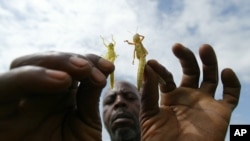WASHINGTON, D.C. —
Local authorities in northern and eastern Sudan have called for help from Khartoum and the United Nations as swarms of desert locusts attack farms, threatening the winter harvest.
The Sudanese are using pesticides to try to control the locusts, but need more than the eight trucks and four crop-sprayer planes that are available in the north to apply the insecticides.
"Some farmers are using primitive means, such as burning tires or beating drums in the fields, to scare away the locusts," reporter Ismail Kushkush said from Khartoum.
"It's not effective but it's better than waiting for help that might not arrive."
The UN Food and Agriculture Organization (FAO) said Wednesday that the "Desert Locust situation continues to remain worrisome."
"The current outbreak originated from breeding during the past summer in the interior of Sudan where adult groups and swarms formed and moved to southern Egypt and northeast Sudan in November," the FAO said.
The Sudanese are using pesticides to try to control the locusts, but need more than the eight trucks and four crop-sprayer planes that are available in the north to apply the insecticides.
"Some farmers are using primitive means, such as burning tires or beating drums in the fields, to scare away the locusts," reporter Ismail Kushkush said from Khartoum.
"It's not effective but it's better than waiting for help that might not arrive."
The UN Food and Agriculture Organization (FAO) said Wednesday that the "Desert Locust situation continues to remain worrisome."
"The current outbreak originated from breeding during the past summer in the interior of Sudan where adult groups and swarms formed and moved to southern Egypt and northeast Sudan in November," the FAO said.





